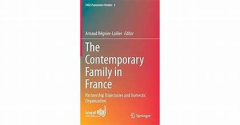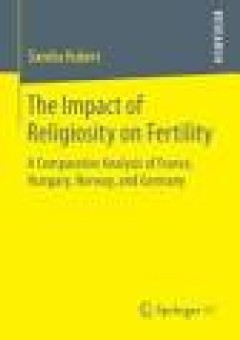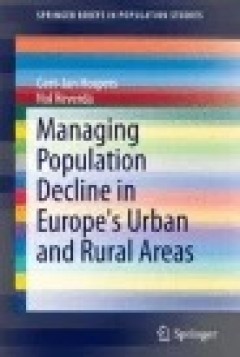Filter by

Cohabitation and Marriage in the Americas: Geo-historical Legacies and New Tr…
This open access book presents an innovative study of the rise of unmarried cohabitation in the Americas, from Canada to Argentina. Using an extensive sample of individual census data for nearly all countries on the continent, it offers a cross-national, comparative view of this recent demographic trend and its impact on the family. The book offers a tour of the historical legacies and regional…
- Edition
- 1
- ISBN/ISSN
- 978-3-319-31442-6
- Collation
- oer.unej.ac.id
- Series Title
- -
- Call Number
- XXV, 291

Wohnen und Gesundheit im Alter
Vor dem Hintergrund der demographischen Entwicklung unserer Gesellschaft nimmt der Open-Access-Sammelband die Wohnsituation älterer Menschen unter besonderer Berücksichtigung der gesundheitlichen Situation in den Blick. Lebensqualität, Wohlbefinden, Teilhabe sowie Autonomie und Selbstbestimmung älterer Menschen stehen dabei im Mittelpunkt.
- Edition
- 1
- ISBN/ISSN
- 978-3-658-34386-6
- Collation
- -
- Series Title
- Vechtaer Beiträge zur Gerontologie
- Call Number
- IX, 285

Demographic and Family Transition in Southeast Asia
This open access book presents the trends and patterns of demographic and family changes from all eleven countries in the region for the past 50 years. The rich data are coupled with historical, cultural and policy background to facilitate an understanding of the changes that families in Southeast Asia have been going through. The book is structured into two parts. Part A includes three se…
- Edition
- 1
- ISBN/ISSN
- 978-3-030-85679-3
- Collation
- -
- Series Title
- -
- Call Number
- XIII, 112

The Contemporary Family in France
This book provides a portrait of the family in France today, revealing many of the deep-seated, demographic changes that have affected French society in recent decades. It first focuses on conjugal and family trajectories, examining union formation, types of union, entry into parenthood, influence of religion, and separation. Next, the book explores domestic organization within the couple. It l…
- Edition
- 1
- ISBN/ISSN
- 978-3-319-09528-8
- Collation
- IX, 273, 63 b/w illustrations
- Series Title
- INED Population Studies
- Call Number
- -

The International Handbook of the Demography of Race and Ethnicity
Examining key countries in every region of world, this handbook presents population profiles and analyses concerning racial/ethnic disparities and changing intergroup relations. Inside, prominent scholars from various parts of the world and disciplines address the links between stratification, demography, and conflict across the globe. Organized by region/continent, coverage for each profile…
- Edition
- 1
- ISBN/ISSN
- 978-90-481-8891-8
- Collation
- XXVI, 629, 97 b/w illustrations
- Series Title
- International Handbooks of Population
- Call Number
- -

The Impact of Religiosity on Fertility
The work investigates the impact of religiosity of women and men on their completed fertility in an international comparison considering a long time period. Sandra Hubert aims at uncovering all mechanisms through which religiosity and religious institutions can affect fertility. Hence, both the micro- and the macro-level of each country are explicitly integrated, and theoretically as well as…
- Edition
- 1
- ISBN/ISSN
- 978-3-658-07008-3
- Collation
- XIV, 283, 13 b/w illustrations
- Series Title
- The Impact of Religiosity on Fertility
- Call Number
- -

Managing Population Decline in Europe's Urban and Rural Areas
This book explores the challenges population decline presents for Europe’s urban and rural areas. It features recent demographic data and trends not only for Europe as a whole, but also for selected countries, and compares growth and shrinkage from a historical as well as a theoretical perspective. In addition, the book critically reviews relevant notions from geography, sociology, and public…
- Edition
- -
- ISBN/ISSN
- 978-3-319-12412-4
- Collation
- -
- Series Title
- -
- Call Number
- -

The Undercount of Young Children in the U.S. Decennial Census
This book covers several dimensions of the undercount of young children in the U.S. Decennial Census, examines the data from the 2010 U.S. Decennial Census in detail and looks at trends in the undercount of children over time. Other aspects included are the geographic distribution of the net undercount and an exploration for some of the potential explanations for the high net undercount of chil…
- Edition
- -
- ISBN/ISSN
- 978-3-319-18917-8
- Collation
- -
- Series Title
- -
- Call Number
- -
 Computer Science, Information & General Works
Computer Science, Information & General Works  Philosophy & Psychology
Philosophy & Psychology  Religion
Religion  Social Sciences
Social Sciences  Language
Language  Pure Science
Pure Science  Applied Sciences
Applied Sciences  Art & Recreation
Art & Recreation  Literature
Literature  History & Geography
History & Geography